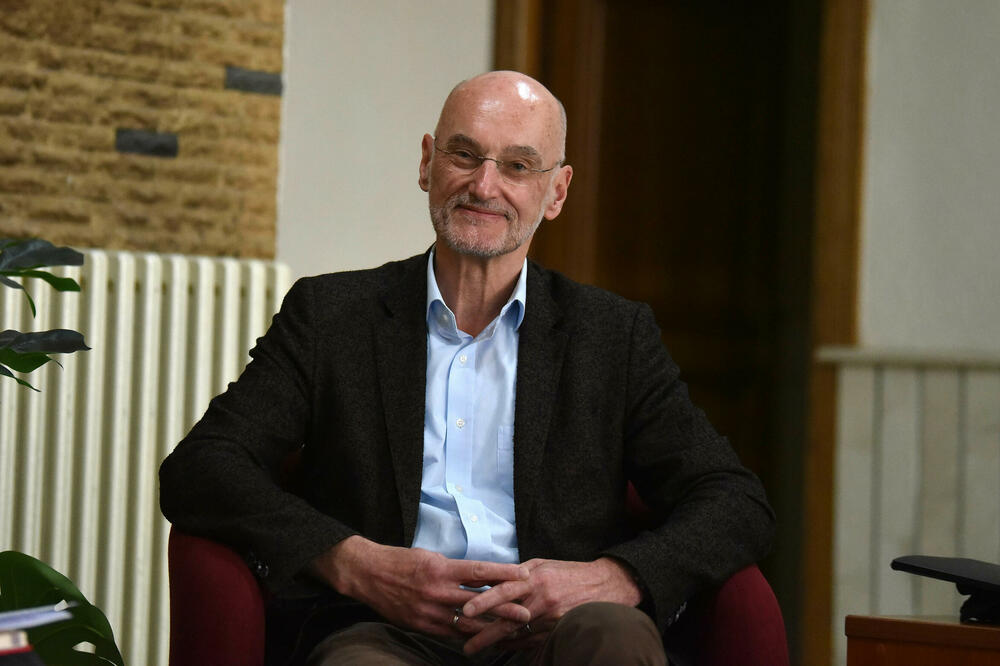The European Union has a future and expansion must happen in the coming period, otherwise everything will become meaningless, says the Austrian historian Wolfgang Schmale who believes that Montenegro and other former Yugoslav states should join the EU as soon as possible.
Šmale said in an interview with "Vijesta" that now is the right time to join the EU.
"There is a very good level of preparation and it should be done now," he said in response to the question of whether he sees Montenegro and the other countries of the Western Balkans in the EU.
Šmale, professor of contemporary history and member of the European Academy of Sciences and Arts, was a guest of the Faculty of Political Sciences in Podgorica on April 12, on the occasion of the publication of the translation of his new book "History of Modern Enlightenment".
He previously published the books "History of the European Idea" (2003), "History of Masculinity" (2011) and "What will happen to the European Union?" (2019).
Šmale told "Vijesti" that it is easier to solve problems in the EU than outside it.
"The problem may be that it is sometimes said that we must reduce the European Union and have more nation states, but that does not work, because the Union is a guarantee that the nation state survives. Among historians, it is a well-established thesis that European integration saved the nation-state from disappearing. And everyone should be aware of this historical moment", said Šmale.
Some countries of the former Yugoslavia have become EU members, and some have not yet. Who do you think is to blame for the fact that all the countries of the former Yugoslavia have not yet joined the EU?
My personal opinion is, of course, that when these countries want, or I should say societies that want to join the EU, they should do it and they can do it as soon as possible. I think things are right now after 10, 15 or sometimes 20 years of preparation and the decision should be made next year. That would be my personal opinion.
Do you share the opinion of certain fellow historians that some current conditions in the EU resemble those in Yugoslavia during the 1980s? Then, after the death of Josip Broz Tito, political leaders began to deviate from key principles, such as brotherhood and unity.
Brotherhood and unity are an essential value, not only since the time of the French Revolution, but it is a good basis for cooperation and joint work. The European Union has, in my opinion, some elements of federalism, federal states, but of course it is not a state. Thus, everything depends on the cooperation and trust between the members. So I live in Austria, but I am originally from Germany, two historic federal states and the trust between the parts of the state must be in good condition to be able to cooperate. And this is necessary for the EU, even in the enlargement process now.
Several years ago, you published the book "What will happen to the European Union?". What is your answer to that question now? Does the EU have a future?
Yes, the EU has a future. The question is which future? In the book, I advocate greater democratic or political rights for citizens. For example, the direct election of the President of the European Commission in order to strengthen the ties between the population and the institutions in Brussels. I think it is crucial for citizens in the European Union to have more rights. And of course, you never know what is going to happen in the world, be it a conflict or a war. It disrupts the Union, but I am quite optimistic because the Union has had so many crises since its inception and there has always been a solution.
Do you see Montenegro and the other countries of the Western Balkans in the EU?
Yes, as I said, I think now is the right time to join the European Union. There is a very good level of preparation and it should be done now. Not too bureaucratic. As a historian, I am not a fan of bureaucracy.
Here, we are very optimistic that this can happen, perhaps already in the next five, six years. What do you think?
Yes, in the coming period, but it will not happen before the (European) elections in June. But then I think that in this period, the functional period, it will happen and it must happen of course. Otherwise it would become meaningless.
Could instability in the Western Balkans, primarily between Serbia and Kosovo, affect Montenegro's European path?
No, I don't think that Montenegro is affected by it. What I also state in the book and in my lectures about the accession of the Western Balkans to the European Union is that after the war, the countries, the six countries that founded the European Economic Community, had just finished the war, but they were not full democracies and had problems with each other and still they did that. First they founded the Union, and then they solved the problems. I think that it is easier to solve problems in the Union than outside it.
What do you see as the key problems in the functioning of the EU and how do you think they should be solved?
There must be a trade-off between interests. The Union is built of nation-states and each nation-state has its own interests, but it must see a common interest that pushes everyone forward, not just the interest of one state. And that was the original idea and the EU must always return to it, it is a kind of idealistic idea of course, but there must be some idealism in the political strategy, otherwise it is not possible.
Are you worried about the possibility that a large number of seats in the European Parliament will be won by right-wing parties in the upcoming European elections, whose leaders are seeking "recomposition of the EU"?
Right-wing parties change over the years, so they are not the same as they were five years ago... It's a democracy, people have the opportunity to choose the parties they want to choose, and after that Parliament has to deal with it. The problem may be that sometimes it is said that we have to shrink the European Union and have more nation states, but that does not work, because the Union is a guarantee that the nation state survives. Among historians, it is a well-established thesis that European integration saved the nation-state from disappearing. And everyone should be aware of this historical moment.
But there are still leaders of those parties who call for the restructuring of the EU. And besides, what if Donald Trump comes back to power in the USA?
I would say - there will be less European Union. It is a risk for the nation-state. And these right-wing leaders must be aware of that. They should read more history books about the origins of European integration. Why did it happen? And then small countries, and most of the countries in the EU are small countries, how will they survive without the European Union? Very difficult.
Do you think that the EU should have its own army?
It's an old idea. Even in the 19th century, when the idea of a united states of Europe arose, one of the first things was the demand for a European army. Sooner or later we will have a European army.
In the preface of your book "History of Modern Enlightenment", you write that the reason for it was "today's ubiquity of Enlightenment". In what way is enlightenment today "ubiquitous" and who are the enlighteners of our age?
Enlighteners in the sense of 18th century enlightenment were thinkers like Voltaire, Rousseau or Kant. But there were also educators in India, for example. It is globally present and I am talking about digital media. Look on Wikipedia or YouTube videos etc. It is very well presented. Leading figures or themes of the Enlightenment, etc. So there is a global interest in it.
The EU is not an extended arm of the US
Some political analysts say that today the EU is not pursuing its own interests, but the interests of the US. What do you think?
I don't think so. There is a conflict of interest between the United States of America and the European Union. Of course, they try to overcome these different interests. But it is not the extended arm of the US. Of course, there is a process and things change. The United States of America is more interested in the Pacific region. Their problem is China, not Europe. Things are changing. I think this will be a very different situation in 6 to 10 years.
Bonus video:





